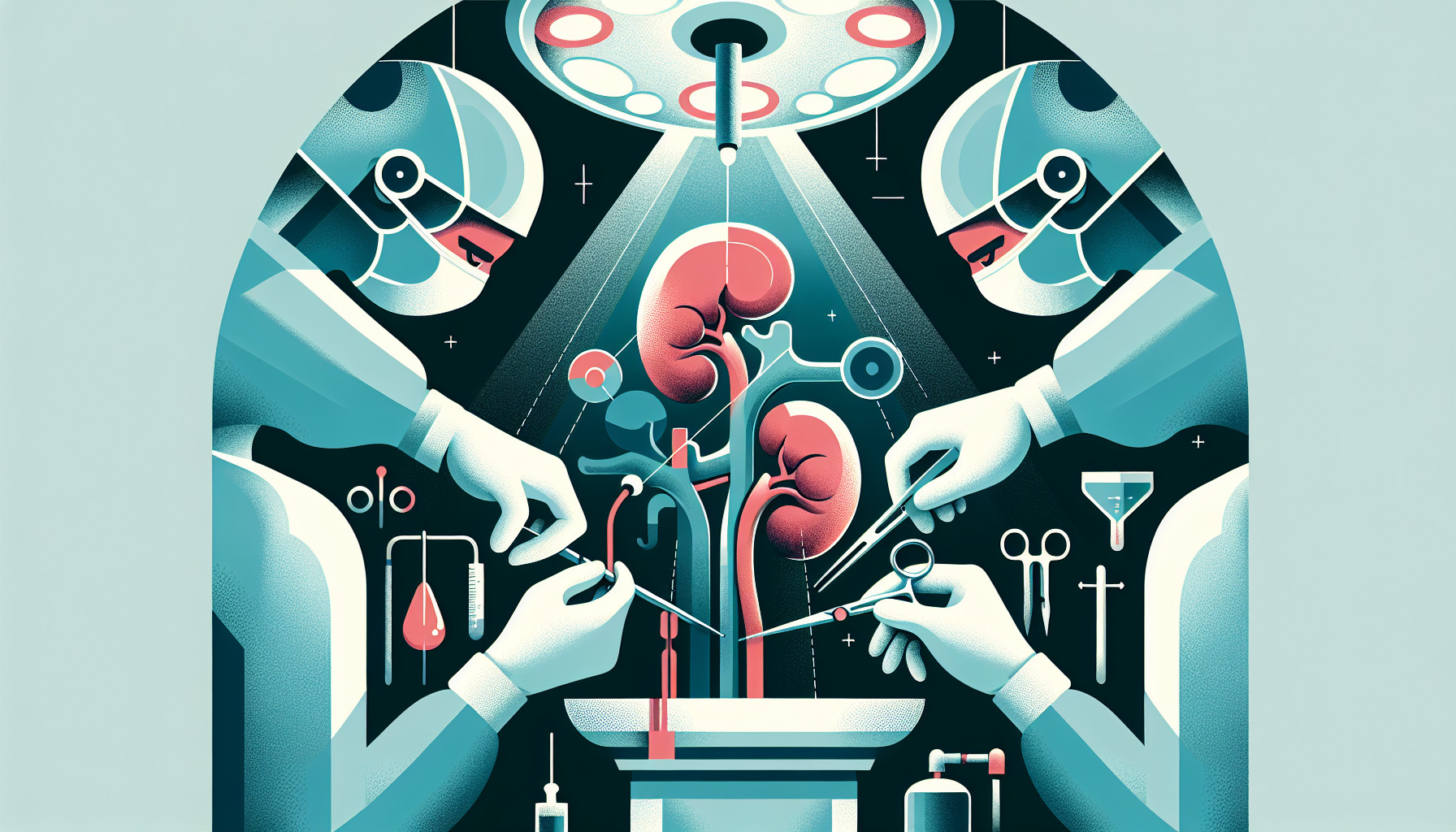Our Summary
This research looks at a certain type of kidney removal surgery (hand-assisted laparoscopic donor nephrectomy or HALDN) and how well it performed on 1864 operations done between March 2007 and January 2022. The study looked at a range of factors, like age, sex, weight, smoking status, previous surgeries, operation time, need for a blood transfusion, the length of the cut made in surgery, time until the patient could move and eat again, kidney function, length of hospital stay, and complications during and after surgery.
The study found that about 44% of the patients were male and about 56% were female, with an average age of around 46 years. Out of all the surgeries, about 7.67% had complications - 3.65% during surgery and 4.02% after surgery. In some cases (0.53%), the doctors had to switch to a traditional open surgery because of problems during the operation. One patient needed another surgery due to bleeding 6 hours after the operation.
The study also found that patients with multiple renal arteries (the blood vessels that supply the kidneys) had a higher risk of complications during surgery and longer operation times. Also, surgeries on the right kidney and on male patients took longer.
Overall, the results suggest that HALDN is a safe procedure with a low rate of complications.
FAQs
- What is the complication rate for hand-assisted laparoscopic donor nephrectomy (HALDN)?
- What factors were found to increase the risk of complications or lengthen operation times during HALDN?
- How often did doctors have to switch to traditional open surgery during HALDN, according to the study?
Doctor’s Tip
One helpful tip a doctor might tell a patient about laparoscopic nephrectomy is to follow all pre-operative instructions given by the medical team, such as fasting before surgery and stopping certain medications as directed. This can help reduce the risk of complications and ensure a smoother recovery process. Additionally, it is important to discuss any concerns or questions with your healthcare provider before undergoing the procedure.
Suitable For
Patients who are typically recommended for laparoscopic nephrectomy include those who have:
- Kidney cancer or tumors that are limited to the kidney
- Severe kidney disease or kidney failure
- Kidney stones that are causing severe pain or infection
- Polycystic kidney disease
- Donation of a kidney for transplant (donor nephrectomy)
- Severe kidney infections or abscesses
- Congenital abnormalities of the kidney
- Kidney trauma or injury
It is important for patients to discuss their specific condition and treatment options with their healthcare provider to determine if laparoscopic nephrectomy is the appropriate procedure for their individual case.
Timeline
Before laparoscopic nephrectomy:
- Consultation with a urologist or surgeon to discuss the need for kidney removal and the potential risks and benefits of laparoscopic nephrectomy.
- Pre-operative tests and evaluations to assess the patient’s overall health and readiness for surgery.
- Pre-operative instructions, including fasting before surgery and medication adjustments.
- Arrival at the hospital or surgical center on the day of surgery for pre-operative preparations.
After laparoscopic nephrectomy:
- Recovery in the post-anesthesia care unit (PACU) immediately after surgery.
- Monitoring for any immediate post-operative complications, such as bleeding or infection.
- Gradual recovery and pain management in the hospital or surgical center.
- Monitoring of kidney function and overall health post-operatively.
- Discharge from the hospital or surgical center once the patient is stable and able to care for themselves at home.
- Follow-up appointments with the surgeon to monitor healing and kidney function.
- Return to normal activities gradually as advised by the healthcare team.
What to Ask Your Doctor
Some questions a patient should ask their doctor about laparoscopic nephrectomy include:
- What are the potential risks and complications associated with laparoscopic nephrectomy?
- How long will the surgery take and what is the expected recovery time?
- Will I need a blood transfusion during or after the surgery?
- How will my kidney function be affected after the surgery?
- What is the likelihood of needing to switch to a traditional open surgery during the procedure?
- Are there any specific factors about my health or anatomy that may impact the success of the surgery?
- How many of these procedures have you performed, and what is your success rate?
- How long will I need to stay in the hospital after the surgery?
- How will my pain be managed during the recovery process?
- Are there any long-term effects or considerations I should be aware of after undergoing laparoscopic nephrectomy?
Reference
Authors: Günaydın B, Uçar T, Arpalı E, Akyollu B, Akıncı S, Karataş C, Öztorun K, Koçak B. Journal: Turk J Med Sci. 2022 Aug;52(4):1322-1328. doi: 10.55730/1300-0144.5438. Epub 2022 Aug 10. PMID: 36326419
